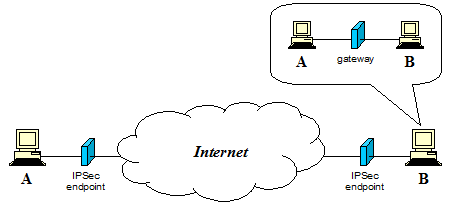VPN Overview
VPN stands for Virtual Private Network – networks connections that pretend they are private, but use the Internet for connection instead of expensive dedicated private cables.
VPN is a concept – not a technology. There are several different technologies, standards, one can use to establish a VPN connection: PPTP, L2TP, IPSec to name a few.
IPSec is the most widespread technology for VPN connections.
What is VPN used for?
Virtual Private Networking (VPN) uses a public network (i.e. the Internet) to securely connect two different networks. For example, an employee can access the corporate network from home using VPN.
Contrary to popular beliefs VPN (using IPSec technology at least) does not put remote clients on the same subnet.
They still are - ![]() must be1) - on different subnets, but they can securely communicate with each other.
must be1) - on different subnets, but they can securely communicate with each other.
Pass-through vs. termination
The Internet Gate can handle VPN pass through. When VPN pass-through is used the Internet Gate doesn't perform any encryption or authentication in the VPN tunnel. The termination is done in the client computer and the Internet Gate only lets the tunnel traffic pass through. IPsec pass-through
VPN termination means the VPN connection is made between the Internet Gate itself and the remote VPN client. It is the Internet Gate that authenticates and encrypts the VPN tunnel. The clients on your LAN do not need to have any VPN capability on their own.
For more information regarding pass-through configuration see:
PPTP tunnel pass-throughs
IPSec tunnel pass-throughs
IPSec NAT-T pass-throughs
VPN Configuration
You configure VPN termination on the VPN page. You can either use the EasyServer and EasyClient, or configure server or client manually.
Common tasks
Create:
Monitor/troubleshoot:

